Welcome to another issue of The Newport Cornucopia where we dig through the newspapers archives for interesting news articles and adverts. All articles are posted verbatim and most headlines are original (headlines in quotes are my own).



Very Foolish
A traveller lately fell amongst thieves in this town, was persuaded to visit a house of ill-repute in that disgusting neighbourhood, Friars' Fields, and was there plundered of a gold watch and appurtenances. If men unhocussed [sic], will suffer themselves to be led by the nose into such dens of infamy, they deserve no commiseration, be the consequences what they may.
— Monmouthshire Merlin, 22nd June, 1844



'Extending the Greyhound Pub'
An article in the Western Mail about the Brewster Sessions in 1898 mention an extension to the Greyhound Hotel from High Street into Cambrian Road which been constructed a few years earlier.
Mr W.H. Rickard, of the Greyhound Hotel, High-street, applied for the provisional grant of a licence for premises shortly to be constructed between the back of the hotel and Cambrian-road. Mr W.L. Moore, having spoken of the great diversion of passers-by down Cambrian-road since its opening some years ago, pointed out that it was not a question of opening a new public-house. The project was to continue an existing passage from High-street into Cambrian-road, to allow of the entry of customers and facilities for storing barrels, &c., and it would also be used as a goods entrance for a shop to be erected.
Customers entering from Cambrian-road would not be permitted to go out by the High-street exit, it being the intention to place an iron railing in the middle of the passage.
This had been resolved upon the suggestion of the watch committee. The bench eventually granted the application, with a slight amendment or two. It may be remarked that a portion of land purchased by Mr Rickard was sold at the rate of £120,000 per acre.
— Western Mail, 1st October, 1886 (Subscription Required)

'A New Frontage for the Greyhound Inn on Cambrian Road'
The Council also diseased, almost ad nauseam, the question of selling 23yds of land at the rear of the Greyhound Inn, High-street, to the owner for £500, instead of £200. Three amendments were proposed over the matter, which means another palatial entrance in Cambrian-road to a High-street public-house, but the Council held fast to the committee's report to charge £500 for the bit of land, which it was explained was of 40 feet frontage.
Mr Proctor Eeles, picking up a statement made by Alderman Phillips that the tenant had offered an extra £100 rent if the back way was secured, maintained that the Council ought to demand £1,000 for the land. Mr Greenland rejoined that it was only fair to say that this offer had dropped through. This sale will be the second which the Corporation have effected of land in Cambrian-road, the other being nine square yards for £200 to the Tredegar Arms.
— South Wales Daily News, 14th October, 1896


Noisy Waits
Seven boys were summoned for being disorderly in Lyne-road, off Shaftesbury-street. Police-constable Noble said he heard them from Shaftesbury-street at three o'clock in the morning, shouting and making a great noise. The Mayor suggested that they were noisy waits, and the defendants immediately took up the cue and said they were signing carols. The bench let them off on payment of 1s. each.
— Western Mail, 26th December, 1900 (Subscription Required)
Neglecting to Trim Hedges
The Rev. Thomas Pope, M.A., vicar of Christchurch, was charged on adjourned summons with neglecting to cut, trim, and cleanse his hedges. The rev. gentleman is also a magistrate.
Mr Mundy, the road surveyor, said he had travelled altogether 300 miles, week after week, to see if the defendant had cut his hedges, but it was not done, and he asked the bench to make an order for him (the surveyor) to do the work, and charge Mr. Pope with the costs, or it would never be done.
It was most unfair that he should have to come here week after week in this way. He hoped the bench would also allow him some expenses. The Bench said the understood that Mr. Pope had cut some of the hedge, and was proceeding with others. Mr Mundy said defendant had only cut the hedges under the supervision of the commissioners, but not under his supervision, except the road leading to Bishpool. On the top of the hill the hedged nearly untouched, and two vehicles could not pass each other. The summons was dismissed, notwithstanding Mr Mundy's protest.
— Western Mail, 21st December, 1874 (Subscription Required)
Damaging a Magazine at the Free Library
John Williams Turner, a boy, was summoned before the Mayor and Mr W. Evans, yesterday, for cutting a piece out of a monthly part of the Family Herald. Mr R.H. Johns, the librarian, said that on two occasions full page engravings had been cut from the Graphic, and the committee then gave public notice that the offenders would be prosecuted.
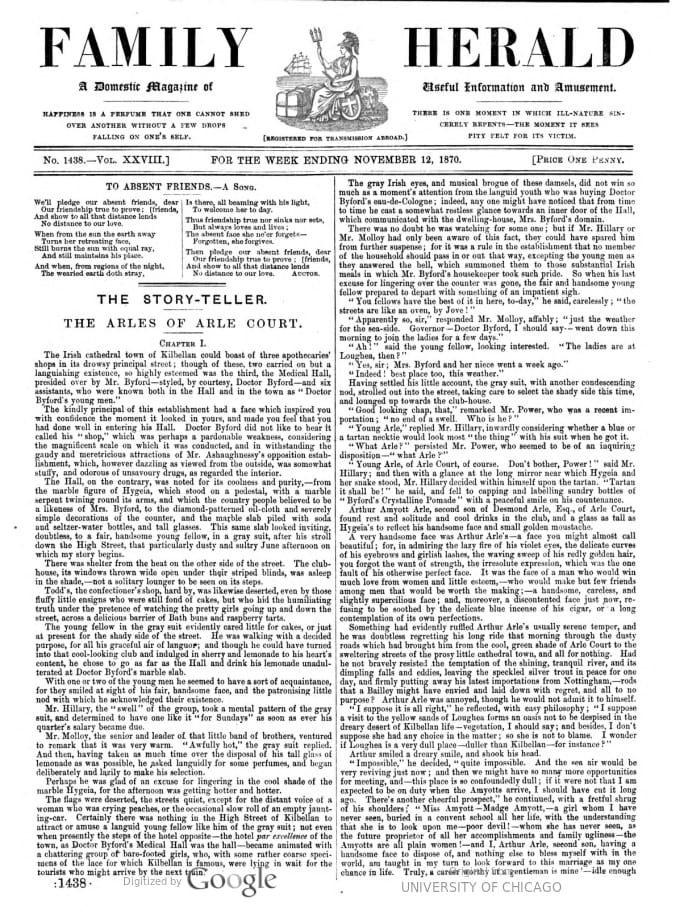

The two publications mentioned in the article. Both are from the same year.
Defendant pleaded guilty, and his father said he believed he did it from thoughtlessness.
It will be as well that the public should know that offenders are liable to be committed for trial, and to be sentenced to six months' hard labour for an offence of this kind.
The Bench ordered the defendant to replace the magazine and to pay 7s 6d. costs.
— Western Mail, 15th November, 1870 (Subscription Required)

'A Proposed Park on the Marshes'
The Mayor said at a recent meeting a committee was formed to consider the advisability of making a park for the people. The committee had never been called together. He believed then and still that the Marshes were the proper place for the purpose. He had asked a friend of his to draw a plan, to utilise the Marshes for the purposes of a park, and he now presented the plan to the local board. It was after the plan of the Manchester People's Park.
The plan included part of Captain Power's land, and proposed to utilise a portion of Crindau Pill as an ornamental water. There were plots for cricket, croquet, and archery. Capt. Power would give a portion of land, so as to make a shapely piece of ground. If they got up an exhibition like the one recently held at Cardiff, they might realise a profit, which, with public subscriptions, would enable them to make the park without asking the ratepayers one penny in the shape of taxes. If they went elsewhere to obtain land, they would have to give £500 or £600 an acre, and that would prevent them from accomplishing the object.
Mr Morgan would like to know the cost of all that which the Mayor had shadowed forth. He was of opinion that the land on the Marshes would be worth £200 an acre for building purposes. They must remember that the land would have be raised before they could make it into a park.
The Mayor: Yes, five feet.
Mr Morgan said the spring tides would rise higher than that. He was of opinion that a more suitable site might be obtained near the Gold-tops. The Mayor said that land would be worth £600 an acre.
Mr Morgan replied that it was very singular how one piece of land was raised in price and the other diminished, to suit the opinions formed of their respective merits. (Whilst the speaker was proceeding the surveyor whispered into his ear.) He had certainly forgotten that he had been selected to adjudicate upon the prize at the forthcoming eisteddford as to the best site for a people's park (Loud laughter).
Mr Batchelor said such a park was very much needed, but he thought the Marshes was the most unsuitable spot they could have selected. Everybody knew that in the spring months the ground was covered with water. In a sanitary point of view it was most unsuitable. It appeared to him that the Marshes was naturally fitted for business purposes, being close to the river, and surrounded by railways.
If they had a park let it be in a healthy neighbourhood — either in St. Woollos, at Maindee, or on the Caerleon road.
He would suggest that the Marshes be let or sold, and the money applied to the purchase of a suitable plot for a park.
The question was then referred to the committee which was appointed a few weeks ago.
— Western Mail, 12th October, 1870 (Subscription Required)

'Told to Clean and Lime Wash Houses'
Inspector of Nuisances Report
The occupiers of fifteen houses, viz., 1 in Cross-street, 2 Constable's-lane, 1 Canal-terrace, 2 South Market-street, 1 Lower Cross-street, 2 Union-court, 3 Dolphin-street, 1 Mill-parade, 1 Florida's-court, and 1 Botany, have had notice to properly cleanse and lime wash their premises, under the provision of the Sanitary Act, 1866.
These houses have had in them thirty-one cases of small-pox, namely, seven deaths and twenty-four recovered.
The notices have been complied with, and the premises are now in a satisfactory condition.
Thirty-three persons have been served with notices to remove nuisances from their premises in town and Pillgwenlly. Nineteen of them have been complied with.
The common lodging-houses are in a satisfactory state and free from any contagious disease.
During the last fortnight the lime brushes have been lent to 28 poor persons in town and Pillgwenlly.
— Monmouthshire Merlin, 2nd February, 1872

On Tuesday morning last, information was received by the Superintendent of Police, that a man was lying dead on board a trow called the Rival, of Gloucester, then lying at Pillgwenlly.
On proceeding thither, he ascertained that the information was correct; and, on enquiring into the circumstances, he received the following account, which was confirmed by the evidence subsequently at the coroner's inquest.
On Monday evening the deceased, whose name was Charles Long went on shore to a beer-house, called the Company's Arms, at Pill. He was there joined by the captain of the trow, whose name is James Cooke, and his brother Wm. Cooke.
They drank together for some time, when the deceased offered to eat two ounces of tobacco, if any one would bet him half-a-crown. This the captain accepted, when Wm. Cooke, Jesse Franklin (the landlord-of the house), and the deceased, went out, and purchased two ounces of roll tobacco.
On their return, deceased took a knife and cut up the tobacco into pieces, about an inch in length, and swallowed the whole in two minutes, observing at the same time he would swallow two ounces more in three minutes. He then drank four or five glasses of beer, and went on board about seven o'clock.
At eleven o'clock he complained of weakness, but appeared to get better;
at three o'clock the crew left him and went to bed, and at six o clock the unfortunate man was a corpse.
On Tuesday an inquest was held on the body by W. Brewer, esq., coroner, when the foregoing facts were deposed to, and the following verdict was returned:—"Died from the effects of eating tobacco, taken voluntarily by himself."
— Monmouthshire Merlin, 3rd October, 1840


Cinquevalli at the Empire

Paul Cinquevalli was a German music hall entertainer whose speciality juggling act made him popular in the English music halls during the 19th and early 20th century. On at least three occasions (1894, 1897, 1900) he visited the Empire theatre in Newport.
This description from Wikipedia gives an idea of the type of show he performed.
Though he performed in a stylized costume consisting of a leotard and tights, he is generally regarded as one of the first gentleman jugglers, because he performed with everyday objects such as bottles, plates, glasses and umbrellas. One of the tricks he originated which is still performed today, was to throw a full bottle in the air, catch the neck of the bottle on the spike of an umbrella, and then open the umbrella as the liquid in the bottle ran out of it. He also incorporated feats of strength in his act. One of his trademark tricks was supporting a chair in his teeth while juggling three balls. On the chair sat an assistant reading a newspaper, and on the assistant's lap was a desk.
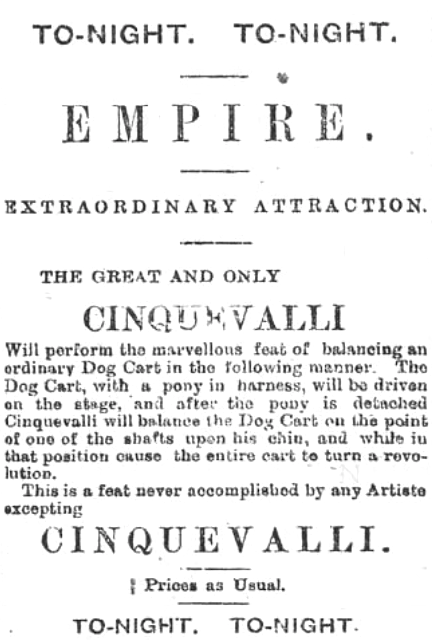
The South Wales Argus published a small article about Cinquevalli's 1900 show at the Empire.
Cinquevalli, the famous juggler, who is astonishing large houses at the Newport Empire, performed a Herculean feat on Thursday, and will repeat it tonight (Friday), and also on Saturday. After going through a clever exhibition of juggling, a spring trap and pony harness was driven on the stage. No time was lost in releasing the horse. The artiste, assisted by his attendants, took off the near wheel.
A shaft was then taken out of the vehicle, and the wheel was set in motion, the "box" being fixed to the point on the shaft. While the wheel was still in motion, it was placed on to the body of the cart. Cinquevalli then lifted the trap on to his chin, apparently without any undue effort. It was an astounding feat, and must be seen to be appreciated. At the close the artiste appeared before the curtain, and was loudly cheered.
— South Wales Argus, Friday 9th November, 1900 (Subscription Required)
His exhibitions in the art of juggling are almost beyond the power of the pen to describe.



An 'Idrotobolic Hat' hat was one which had ventilation valves to control the flow of air over the head.

'Hunting on the East Side of Newport'
An excellent pack of hounds met at Duckpool, on Monday morning last, and found in the first small cover they drew, some tact being displayed on the occasion; away went master reynard as straight as a line tor the top of the hill, and sunk on the other side for Maindee, headed back towards St. Julian's wood, which, he disdained entering, skirting alongside the wood, he made for the Coldra wood, which from the capital scent, soon becoming too hot for him, he crossed the Chepstow road for Langstone, from thence over the brook for Llanwerne, bearing to the left for the "Routs," then away to Llanmartin.
The pace was very severe; they viewed into a small cover just beyond Lanmartin, with the hounds close upon his brush, so close, indeed, that it was evident his career was closing, and he never saw the other side and thus ended as good a run as a man with proper feelings for his horse need desire.
— Monmouthshire Merlin, 1st December, 1849


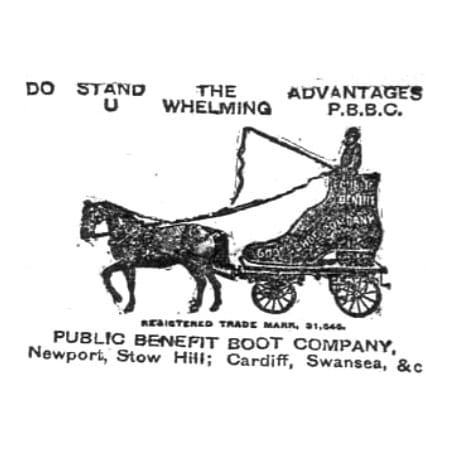
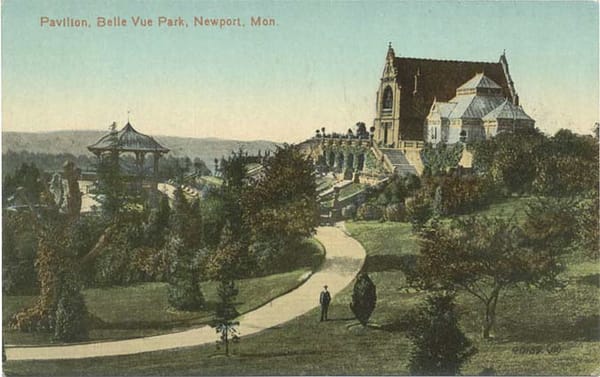
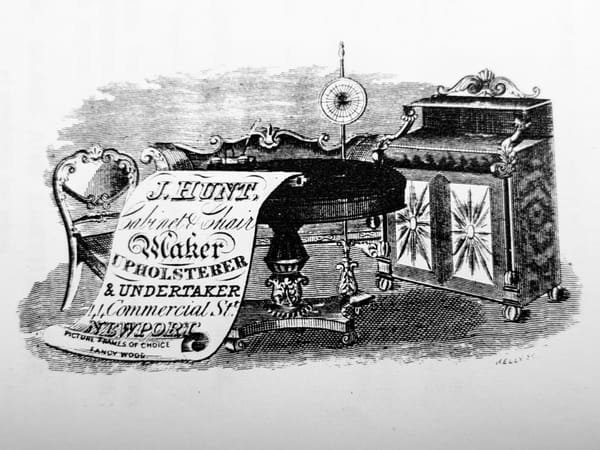
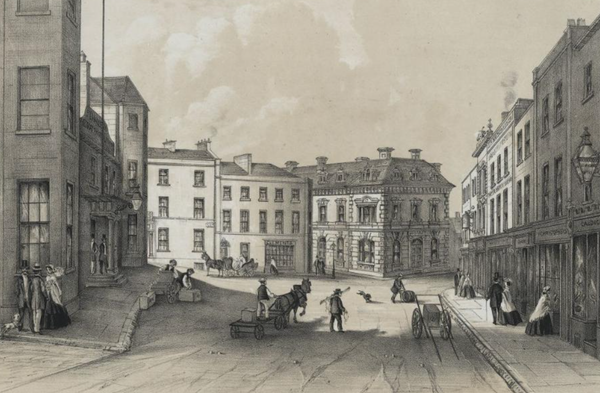
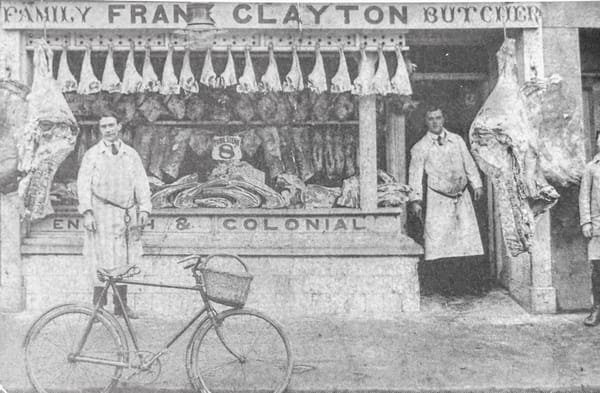
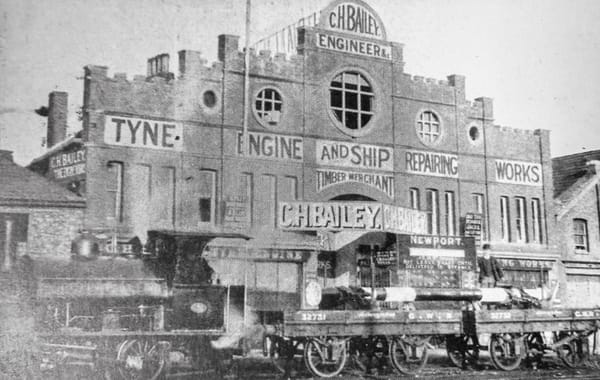

Member discussion